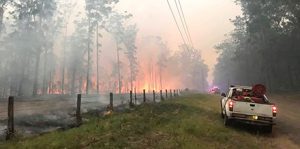This week marked the official end to the most devastating bush fire season in New South Wales’ history. Nationally the fire season, which is still in force in Victoria and South Australia, was unprecedented in terms of conditions experienced, the loss of lives and property, and the threat to communities. Source: Bruce Mitchell
In NSW alone there were six days where areas across the state recorded catastrophic fire weather conditions.
“At the height of activity, there was on average around 2500 firefighters in the field each shift with up to 4000 on days of increased fire danger and impact,” NSW Rural Fire Service Commissioner Shane Fitzsimmons said.
“We have seen a combined inter-agency response from NSW RFS, Fire and Rescue NSW, National Parks and Wildlife Service, Forestry Corporation NSW, NSW State Emergency Service, NSW Police, NSW Ambulance and the Australian Defence Force come together with our interstate colleagues,” he said.
“Responding to bush fires is a team effort, and the community across NSW is an important team member.”
“We must also be mindful of all those still enduring the very raw and difficult recovery process as a result of the fires and that efforts are sustained through this very personal challenge.”
The NSW State Government’s response on Thursday to meet that “very personal challenge” by creating a Department of Regional NSW to co-ordinate the response on all regional issues is to be welcomed.
Country people across regional NSW often complain – and have done so for years – that their state governments have been far too “Sydney-centric”.
Justified or not – and quite often it has been – this new department is a recognition that regional communities in New South Wales matter.
Too often regional centres in crisis have, across Australia, been subjected to a fractured response when it comes to recovery.
This new department brings together primary industries, resources and geoscience, and local land services agencies.
AFPA CEO Ross Hampton quite rightly points to the appointment of Gary Barnes as Secretary as someone who understands regional NSW and has done a great job representing it in his current role as Coordinator General for regional NSW in the Department of Planning, Industry and Environment.
And Mr Hampton quite rightly urges the new department to set bushfire recovery as a major priority.
While Covid-19 is capturing the headlines across the country, the devastation and emotional scarring caused by the fires will still be the focus of many in those areas affected.
The new department will have a wide brief, but bushfire recovery must be the priority. So much good across so many communities will flow from that.
Which brings to mind a thought.
The Prime Minister Scott Morrison has successfully led a united National Cabinet to co-ordinate the battle during the Covid-19 pandemic.
There has been no public criticism from Labor premiers about the national cabinet, only praise. All premiers and chief ministers have welcomed the sharing of information and discussions about appropriate policy responses.
Why didn’t this happen during the bushfires?
In Victoria, the extension of the Regional Forest Agreements to June 2030 by the Australian and Victorian Governments does provide some level of certainty for a forestry industry wracked by uncertainty caused by the Andrews Government’s plan to end native forest harvesting by the end of the RFA.
But the Institute of Foresters of Australia, and the State Shadow Minister for Agriculture Peter Walsh were united in their muted response to the RFA extension.
As Mr Walsh quite rightly pointed out, the Victorian Government has stonewalled this process for years which only served to create more uncertainty on jobs and confidence in the sector.
And IFA/AFG President, Bob Gordon observed that by renewing these agreements for only 10 years and placing them out of step with all the other Regional Forest Agreements in Australia, it would appear to confirm the Andrews Government still plans to exit native forest harvesting by 2030.
The Victorian Association of Forest Industries, the Australian Forest Products Association and the Australian Forest Contractors Association also voiced similar concerns.
That reticence is understandable; if a dog bites you three times, logic says you’d have to be cautious patting it a fourth time.
The past week has sadly seen the passing of two of the timber industry’s giants in Richard Neville-Smith and Max Walker.
Mr Neville-Smith, the former Chief Executive of Neville Smith Forest Products passed away last week in Melbourne aged 82 after a long illness. The business was started in 1924 by Mr Neville-Smith’s father and branched into the forest products industry with timber mills in Victoria and Tasmania.
His funeral was held yesterday.
Max Walker, the worthy recipient of the VAFI Lifetime Achievement Award late last year, left school at 14 and started work with his father in the bush prior to World War 2.
His sawmill in Corryong has been an institution in that region for 50 years.
The mill is the largest employer in the region and employs 22 staff and their families, and the township relies on the jobs it provides and the money it brings into the region.
Employees at the mill said Max was a fair, understanding and generous man and that it had been an honour to work alongside him and learn from him.
They will be missed, and it is doubtful we will see their likes again.






